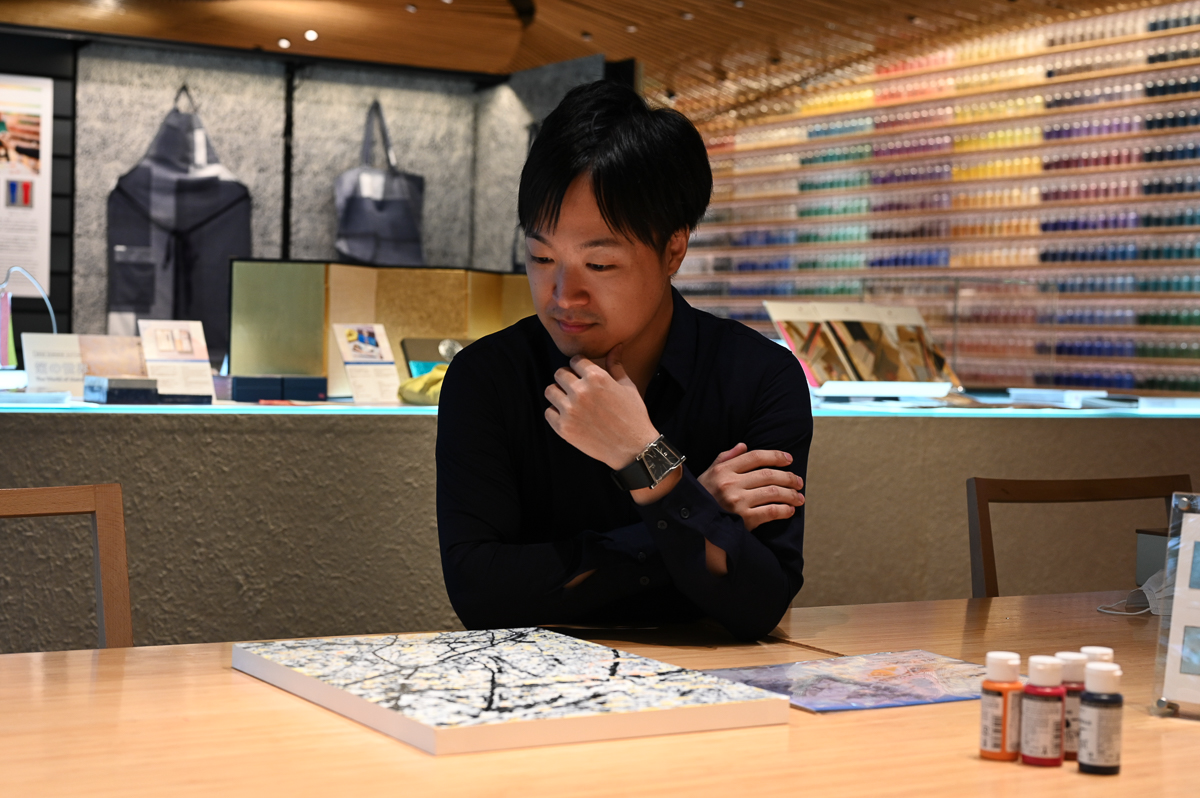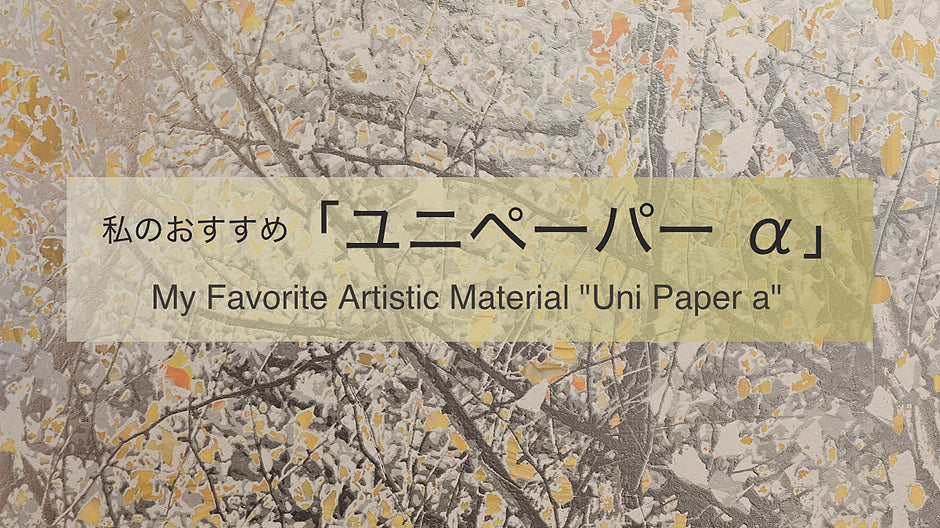PIGMENT TOKYO isn’t just an ordinary art store but also a place that gathers artists from different kinds of art fields.
At PIGMENT TOKYO, we offer not only oriental art materials, but also a wide variety of items from traditional painting techniques to modern art tools.
As such, what kind of art materials do the art experts use in their work?
In this interview, we invited Masayoshi Nojo, who is known for his metal leaf-based artworks, and to find out what kind of materials he uses to create his art, we are going to explore the secrets of his artistic process.
- We asked you about the concept of your work in the previous interview, but what is your process for creating these new pieces?
First of all, I pour acrylic paint on top of this drawing board (Uni paper α is stretched on the board) to create a marbling-like base. Then I start to silk screen an image, but instead of using paint, I use acrylic medium as a glue for silver and aluminum leaf.
On top of the completed base, I create my drawing by overlapping layers of details, to be honest, most of my works are actually inspired by the idea of “grayscale”. Gray scaling is a technique that is commonly used in black-and-white photographs, by using different shades of gray to represent an image. As a result, certain parts of my work might look like a photograph, even though the painting itself is just a flat surface, due to the reflection of the metal leaf as if it appeared in a three-dimensional phenomenon.

PIGMENT TOKYO × Art Materials Expert Vol.2 ~Masayoshi Nojo~
- Specifically, what items do you use?
Most of the art materials that I use are from PIGMENT TOKYO, such as silver and aluminum leaf, gel mediums, pigment pastes etc.

- I see that you are using a unique kind of paper as your canvas.
This drawing uses something called Uni paper α, which is stretched to the drawing board.
Until now, I used to use a mixture of adhesive and plaster putty as an undercoat.
However, after applying the undercoat, it had to be dried and polished, so I had to do a lot of prep work before starting to draw.
This Uni paper α, meanwhile, is smooth and provides the same effect as a smooth undercoat texture without the need for Dosa sizing (a Japanese traditional technique for preventing color bleeds on paper), making it possible to get on with work more quickly.
The main ingredient of Uni paper α is water-resistant polypropylene, which makes it easier to preserve. Furthermore, the lineup includes a maximum of 310cm x 10m rolls, making it ideal for creating large-scale productions.

Solo Exhibition "Under the moon light"
@JD MALAT Gallery / London
- In addition, are there any other unique traits?
Uni paper α is very compatible with resin paints such as acrylic paints, and it’s also suitable for painting with mineral pigments, metal leaf and pencils.
Even in the case of oil paints, it is possible to create a base coat to make the paint adhere to the paper.
Since there is no difference between the front and back sides of the paper, and the ink does not affect the other side easily, so allowing you to use both sides.

- I see that your work is used for the front cover of this product, right?
This base material was commercialized as a result of joint research between Kyoto University of the Arts (formerly Kyoto University of Art and Design) and Maruoka Inc. I'm very grateful to have my artwork used for the cover of this product as we are handling the items at PIGMENT TOKYO.
There are two sizes available: A4 size (297 x 210 mm) in 10 sheets and F6 size (409 x 318 mm) in 40 sheets. I recommend this product for people who want to buy it for experimental use.
(We also offer 1m x 10m rolls. Please click here for details.)
- How can we use this Uni paper α?
As mentioned above, the paper is very durable and can be framed and used as is.
It is also possible to use a special adhesive to attach it to the drawing board.
However, Uni paper α is very thin and a bit difficult to laminate, so if you would like to get a quotation, please contact us for a free estimation using the form below.
https://pigment.tokyo/en/pages/contact?large_orders=selected
- What kind of material would you like to try in the future?
Although I have lots of new ideas, I am currently recreating my works with a try of resin paints and chemical products. I hope to present these works along with my previous series at my forthcoming exhibition.
- Lastly, if you have any announcements to make, please do so.
I am participating in the “Shikansuiyo - Beautiful Forest and Nature”, an art exhibition of the Meiji Jingu Forest Festival of Art, which is being held at Meiji Shrine until September 27th.
I’m exhibiting a「Kasuga Tsuitate」(a single-panel portable partition), which is fully made of acrylic board.
This exhibition focuses on works created by 40 contemporary artists with a sense of awe, respect and passion for nature and life towards Meiji Shrine and its sacred grove.
The works that have been chosen came in all kinds of style and media, such as Japanese folding screens, hanging scrolls, Tsuitate, Sensu etc.
In particular, the Sensu-designed paintings that will be displayed on a single wall, they were all created by 30 contemporary artists of note who are both talented and skilled.
Hope you will enjoy the beauty of the art with the wonderful greenery of Meiji Shrine.

Exhibition Info

・Address
〒160-0013
1-1 Kasumigaoka-cho, Shinjuku-ku, Tokyo
・Traffic Guide
JR Chuo-Sobu Line: Shinanomachi Station, 5 min walk
Oedo Line: Kokuritsu-Kyōgijō Station, 5 min walk
Ginza Line, Hanzomon Line, Oedo Line: Aoyama-Itchome Station, 10 min walk
https://jingu-artfest.jp/shikan-suiyo/
*This exhibition has ended.
Artist Bio
Masayoshi Nojo

Photo by : Universal Music Art Project
https://www.universal-music.co.jp/artproject/
Solo Exhibitions :
2020 JD Malat Gallery, London
2017 「Mirage」Tokyo Arts Gallery, Tokyo
2016 「Mirage」Gallery Art Composition, Tokyo
Group Exhibitions :
2019 Universal Music Art Project 17, Tokyo
JD Malat Gallery, Group show, London
Cultural Tea Colloquy of Shimogamo, Shimogamosaryo, Kyoto
2018 JD Malat Gallery, Group show, London
Cultural Tea Colloquy of Shimogamo, Shimogamosaryo, Kyoto
2017 완.완.완(刓.婉.完) Ujang Art Gallery, Seoul
2015 Brilliant Corners, Tokyo Arts Gallery, Tokyo
Art Award Tokyo Marunouchi 2015, Marunouchi Building 1st Floor Marucube, Tokyo
Stars popped out of Chaos - Next Generation of Artists - , Graduation show, Spiral Garden, Tokyo
Kuriwada Eichi Special Award Ceremony, Sagawa Art Museum, Shiga
Art Fair :
2019 Contemporary Istanbul 2019, JD Malat Gallery, Istanbul Turkish
Art Central Hong Kong 201, Gallery Art Composition, Hong Kong
ZONAMACO 2019, JD Malat Gallery, Mexico
2018 KIAF 2018 ART SEOUL, Gallery Art Composition, Seoul
VOLTA NY 2018, Gallery Art Composition, New York
ART FAIR TOKYO 2018, Gallery Art Composition, Tokyo International Forum
ARTIST’S FAIR KYOTO, The Museum of Kyoto
2017 ART JAKARTA 2017, Gallery Art Composition, Indonesia
ART FAIR TOKYO 2017, Gallery Art Composition, Tokyo International Forum
2016 ART OSAKA 2016, Gallery Art Composition, Hotel Granvia Osaka
ART FAIR TOKYO 2016, Gallery Art Composition, Tokyo International Forum
2015 ART TAIPEI 2015, Taipei World Trade Center
Academic Performance :
2015 Graduated from Kyoto University of Art and Design, Master’s degree
2013 Graduated from Kyoto University of Art and Design, Bachelor’s degree
Honors and Awards:
2014 Kyoto University of Art and Design, (Bachelor’s) Graduation Exhibition, Sagawa Art
Museum, Kuriwada Eichi Special Award
2013 Kyoto University of Art and Design, (Master’s) Graduation Exhibition, Best-In-Class
Award
Arts Bar 2013「Kyo no Souzou」, Grand Prize
ALBION AWARDS 2013, Prize-Winner
TURNER AWARDS 2013, Merit Award
TOKYO WONDER SEED 2013
*Works owned by numerous private and public collections








